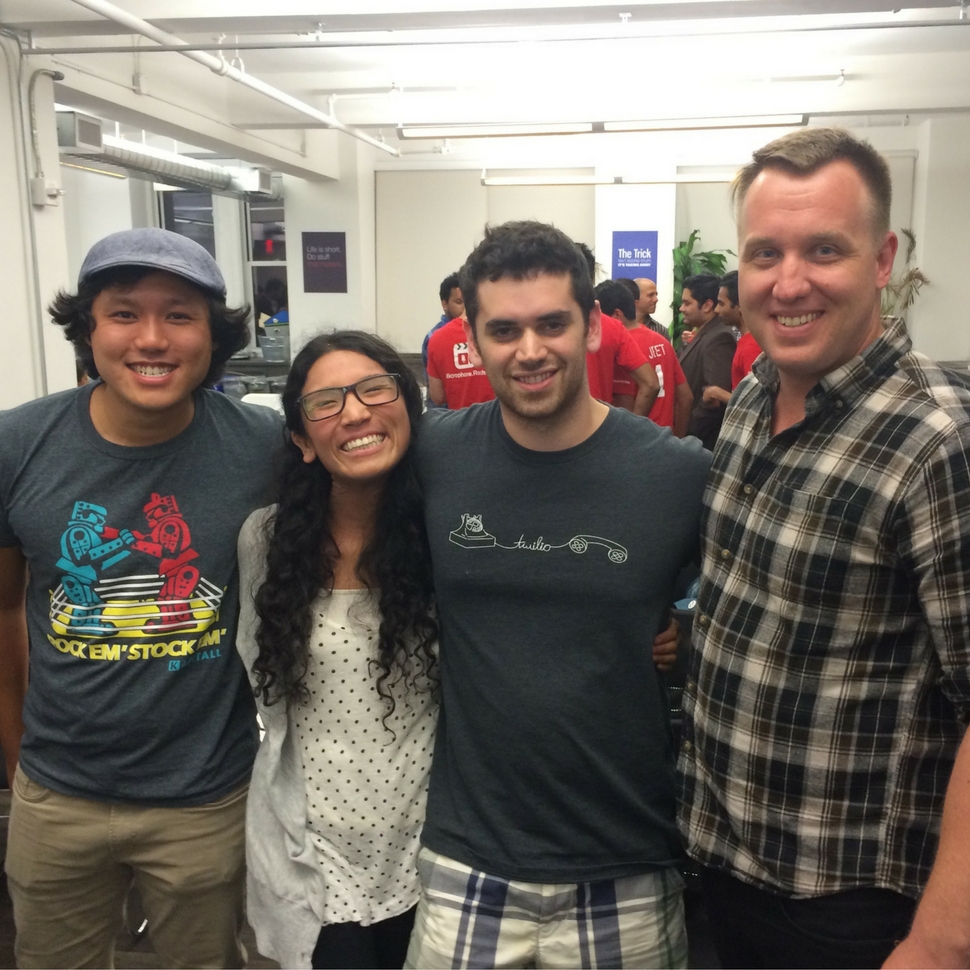Pictured above Croissant co-founders (left to right): Adam Chew, Nisha Garigarn, Dave Idell, Zoltan Szalas
Third up on our Industry Game-Changers series is Croissant, a mobile app that works as a coworking passport in four cities across the US.
Founded little over a year ago, Croissant has transformed the way mobile workers search for and find workspace in NYC, Boston, Washington DC, and San Francisco.
We interviewed Dave Idell, co-founder of Croissant, to learn more about how the app has disrupted the coworking industry and what the coming year has in store for it.
With their track record, and having recorder over 2 million minutes of coworking in less than 18 months, we are certain that Croissant will continue growing, expanding, and disrupting the way coworking spaces operate and find new members and partners.

What inspired you to create Croissant?
Back in the day, the team was working on building a different company. We lived in different neighborhoods and would come to coffee shops in midtown Manhattan to meet and collaborate. It was during this time that we spent many hours searching for seats, experiencing bad wifi, and buying coffees and croissants because we felt guilty about sitting there. This inspired the initial idea of an app that would enable people to book and pay for seats ahead of time at the best coffee shops around town. That idea later pivoted to coworking spaces, because it just made sense naturally. They’re like coffee shops, but better. There’s good wifi, plenty of seats, and unlimited coffee!
How did Croissant disrupt the workspace industry?
We were lucky to be able to get some great partners early on who supported our efforts, and were excited to see us succeed. For customers, it was through word of mouth and some heavy doses of PR that we were able to get the word out in New York. Over the past year, we’ve disrupted the workspace industry by giving customers a much needed, flexible alternative to existing flexible options.
How do you see coworking evolving?
It’s hard to say what the future will bring in terms of coworking, but some trends are inevitable. Technology has enabled the opportunity for remote teams to collaborate without the need for an office. This isn’t just happening at the startup level, but also for large corporations. Coworking spaces will likely continue to flourish as other spaces like coffee shops and retail stores also join in to meet the needs of the workspace market, by providing dedicated areas or times in which laptops are the norm.
How has Croissant helped evolve the nature of the coworking industry?
Croissant has acted as the bridge between the real estate side of the coworking world and the software and logistics side that powers it. As we move forward, software will enable more fine-grained options for customers, as well as virtual and offline communities where they can meet other like-minded individuals.
What are some aspects/elements of the app that have changed since its beginning? Why did you make these changes?
In the beginning, the app was purely spontaneous, where you could only walk up to a space and “Check In”. Over time, we noticed that members weren’t able to use some spaces because they were worried about the availability of seating. That’s when we developed a “Hold a Seat” option, where members could rest assured that a seat would be waiting for them when they got there. This enabled more spaces to see more members in more neighborhoods.
What are some differences you’ve observed across the different cities you are present in?
The spaces have actually been mostly consistent between different cities. They generally have some sort of business model that relies on generating revenue from the utilization of their space. Croissant helps fuel this model by providing lead generation to people who would otherwise not consider coworking, acting as a source of “found” money and leads. Member behavior has varied in terms of transportation. For example, in New York, members would often go to spaces in both midtown and downtown on a given day, whereas in Washington DC, a singular space is often picked for the day because it’s harder to jump around town.
What is Croissant’s next ‘big thing’?
As we continue to expand to other cities, we’re focusing on building more community into the product. Our members are looking for more opportunities to meet each other. While we’ve already added some features for this, such as the member newsletter and the community message board, there’s still a long way to go. Stay tuned for more goodies!
What are you willing to put your money on industry-wise? Is there a trend you’re seeing that you believe will take over the industry anytime soon?
There’s no magic bullet here. The growth of the industry will involve a lot of small iterations on technology and community. Nonetheless, anything that adds more flexibility and affordability to the equation will probably do very well in today’s market.
Anything else you’d like to add?
What do you want to see in the dream workspace experience? Let us know at [email protected].















